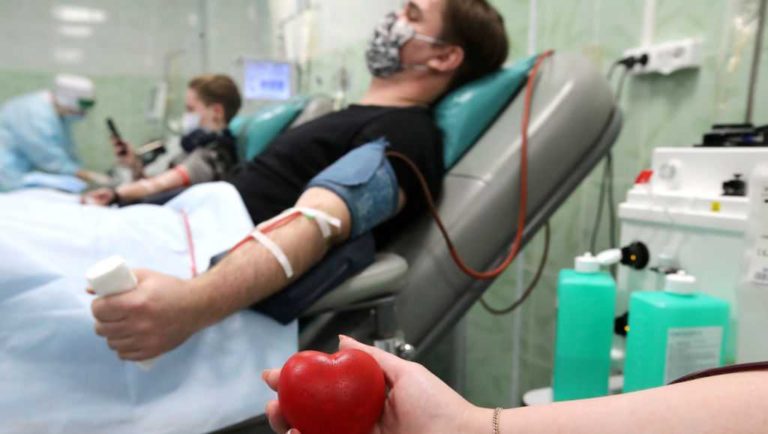

Parker Bowles. Stewart: New research may allow more gay men to donate blood. Only where gay men have recently been allowed to donate blood. MICHELLE MEREDIT HEXPLAINS. [SIRENS] Michelle: June 12, 2016, Pulse Massacre. Forty-nine people were killed, Dozen was injured, and he helped people in a long line to donate blood. However, many gay men were shocked. Since the 1980s, blood donated by gay men has not been accepted. This is a ban that began during the AIDS epidemic. >> There wasn’t a good test of HIV to test blood in illness, so there are a lot of COVIDs where much is not known about it, and unlike COVIDs, it can spread through the blood supply. There was sex. Michelle: The FDA lifted the ban to donate blood with strict guidelines only if gay men reported not having sex with men for a year. When donations fell during the Pandemic Covid, the time was reduced to three months. There are still stigmas. >> My blood is as red as you and my blood can save your life. The life of someone else. It’s frustration and there is associated anger because you want to help. MEREDITH: This week, the FDA announced a new study to allow gay men to donate on a case-by-case basis. For example, a couple in a devoted relationship can qualify. The FDA has partnered with Orlando’s OBLOOD and CENTER to make that happen. The studies conducted here in Orlando, San Francisco, Washington DC, and Miami are looking for 2 to 300 participants in each study. Scott is a volunteer and accepts its importance. >> If they go to donate blood, they are no longer shy, no worries, only others in the room like everyone else. Michelle: And another step in the fight for gay people to be fully accepted in Michel Meridis, Orange County, American Society.Summer: Research results are expected to be ready by the end of
New research may allow more gay men to donate blood
On June 12, 2016, the Pulse slaughter killed 49 people, injured dozens, and formed a long line to donate blood, but many gay men were shocked. Since the 1980s, blood donated by gay men has not been accepted. This was a ban initiated during the AIDS epidemic. In 2015, the FDA lifted the ban on blood donations according to strict guidelines. He was eligible if he reported that a gay man had not had sex with a man for a year. When donations decreased during the COVID-19 pandemic, the period was reduced to three months. Still, there is a stigma. This week, the FDA announced a new study of works that could allow gay men to donate on a case-by-case basis. For example, a devoted couple may qualify. The FDA has partnered with Oneblood and the Orlando Center to make that happen. Surveys are currently being conducted in Orlando, Miami and Washington, DC. For about 200-300 participants. Another step forward in the fight for gay people to be fully accepted by American society. The results of the survey will be ready by the end of the year. Click for more information on the survey. here.
On June 12, 2016, after the Pulse massacre killed 49 people and injured dozens, people lined up for blood donations.
However, many gay men were shocked. Since the 1980s, blood donated by gay men has not been accepted. It was a ban that began during the AIDS epidemic.
In 2015, the FDA lifted the ban on blood donations according to strict guidelines. He was eligible if he reported that a gay man had not had sex with a man for a year. When donations decreased during the COVID-19 pandemic, the period was reduced to three months. Still, there is a stigma.
This week, the FDA announced a new study that could allow gay men to donate on a case-by-case basis. For example, a devoted couple can qualify.
The FDA has partnered with Oneblood and The Center in Orlando to make that happen.
The survey is currently scheduled to take place in Orlando, Miami and Washington, DC. They are looking for about 200 to 300 participants.
This is another step in the fight for gay people to be fully accepted by American society.
The results of the study are expected to be ready by the end of the year.
New research may allow more gay men to donate blood
Source link New research may allow more gay men to donate blood